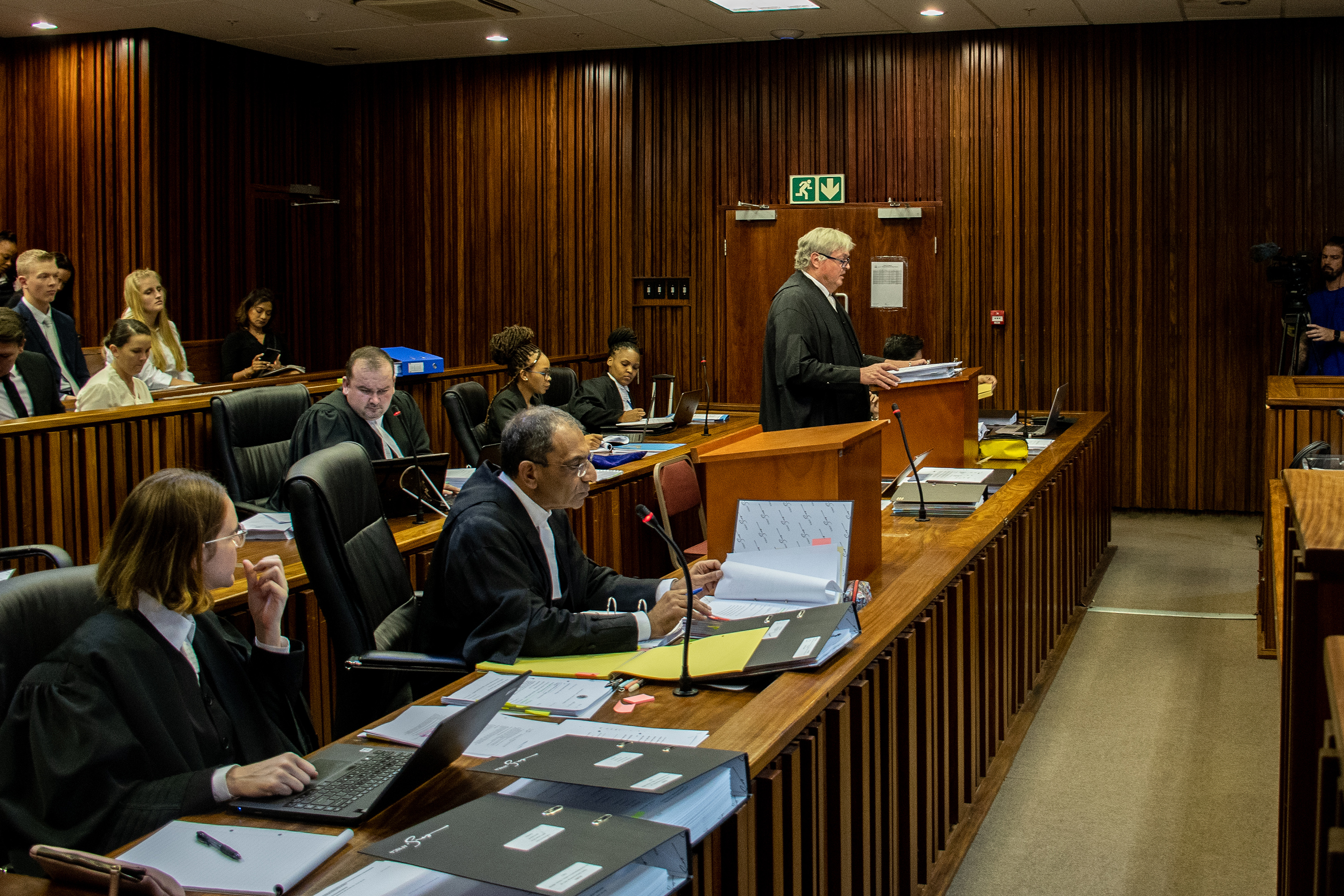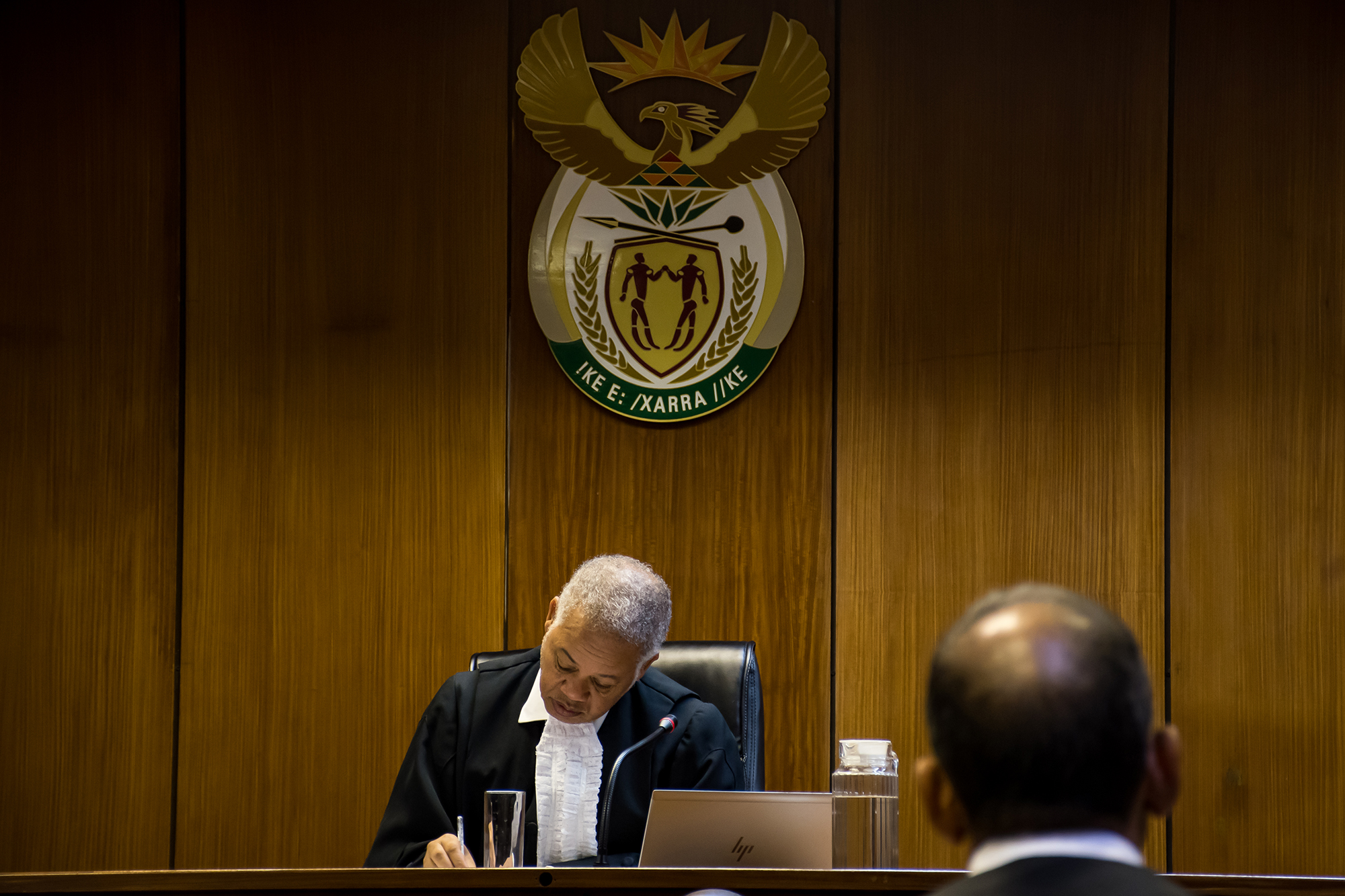Home › Forums › A SECURITY AND NEWS FORUM › Small Free State town in high court battle with Eskom over use of solar energy to reduce load shedding
- This topic is empty.
-
AuthorPosts
-
2023-04-07 at 12:39 #399316
 Nat QuinnKeymaster
Nat QuinnKeymasterIn a case before the Johannesburg High Court on 5 April, a small community in the Free State took on Eskom for the right to use independently generated solar power to mitigate the effects of rolling blackouts in the city of Frankfort.
Eskom is trying to stop residents in Mafube Municipality from implementing “voiding”, the process of using alternative, non-state-sponsored energy to make up for energy deficits as in the case of load shedding.
“We’re going to fight for that voiding,” CEO and engineer at Rural Maintenance Chris Bosch told Daily Maverick in the courtroom after arguments were heard. “Because remember, if you’re in a small town, if you’re a small business, you either have a petrol generator running when the power is off, and if you’re poor, you have nothing.” He added that supplying energy when the grid cannot will allow residents to have at least an hour and a half of additional electricity.
Eskom is strongly opposed to Mafube Municipality using its own separately sourced energy and is concerned that “it would encourage customers throughout the country who have additional embedded generation capacity to claim similar relief”, according to its affidavit.
Urgent application by Rural Maintenance
The applicants in the case, which include Rural Maintenance, its subsidiary and the Mafube Business Forum, are seeking to preserve the status quo – allowing them to keep providing power to Frankfort, thus alleviating load shedding – until the National Energy Regulator of South Africa (Nersa) finds a resolution or investigates their complaint.
Rural Maintenance is a private company that has managed the network distribution on behalf of the Mafube Local Municipality for the past 11 years.
Bosch said that before the company took over management of the network the municipality was collecting R1.7-million a month, way below the R5-million Mafube needed to pay Eskom every month, on top of salaries and material costs.
“And the network was buggered,” said Bosch. “There wasn’t electricity in town for days on end.”
He explained that since the municipality and Rural Maintenance entered a 25-year agreement, of which 14 years remain, the municipality has saved money and the distribution has improved.
Rural Maintenance’s subsidiary, Rural Maintenance Free State (RFS), began providing the town of Frankfort (in the Mafube Municipality) with power from a new solar PV plant, FF Renewables, at the end of 2021.
The solar farm now has four different plants in operation. The first was commissioned at the end of 2021 and started producing 700 kilowatts (KW) for Frankfort, and after the other three plants were commissioned at the end of 2022, the solar farm was providing the town with a total generation capacity of 4.26 megawatts (4,260 KW) by the end of that year.
Since RFS has the access to and right to use the solar plant as an embedded generation facility, it is currently providing Frankfort with electricity from the privately owned solar PV farm during daylight hours, which include load shedding periods, to alleviate Eskom’s rolling blackouts.
An embedded generation facility is an electricity generation plant that is connected to a distribution network (which carries electricity from substations to homes and business), not Eskom’s transmission network (which carries electric power from power stations to the substations).
FF Renewables is a private company whose 21 shareholders include private individuals, farmers and businesses (including Rural Maintenance) active in the Mafube community.
Bosch told Daily Maverick that the solar farm was originally started to help economic growth in Frankfort, and because Rural Maintenance said it couldn’t in the short and medium term provide Frankort with further electrical capacity because its networks were constrained.
After the solar farm was ready, the power generated had no designated outlet, so the asset manager of the solar farm and Rural Maintenance set up an interim arrangement whereby the solar farm would provide power to Frankfort as an embedded generation facility.
Now Frankfort has had two sources of supply: one from the Eskom transmission grid and another from the solar farm. “We’re paying them [15%] less than what we would pay Eskom,” Bosch said.

Advocate Etienne Lasuschagne (standing), who is representing the applicants in the case (Rural Maintenance and co), presents his argument to the Johannesburg High Court (Gauteng Local Division of the High Court of South Africa) on 5 April 2022. Azhar Bham, senior counsel representing the respondents of this case (Eskom) and Advocate Catherine Kruyer, seated to the left. (Photo: Julia Evans)
Advocate Etienne Lasuschagne, who is representing the applicants in the case (Rural Maintenance and co), argued that “RFS is in a position to do something which Eskom can’t, and that is that it can keep what is called critical loads live”. He explained that critical loads include water and sanitation services within Mafube and neighbouring towns.
“As soon as you turn off electricity to reticulation services pertaining to water reservoirs and sanitation services the inevitable result is the drying up of reservoirs and spillage of sewage into the ecosystem,” said Lasuschagne.
Ifeel that Eskom and the government aren’t ready to let go of the vertically integrated utility model and believe that Eskom will rise again – this is very difficult to imagine.
It’s important to note that the solar farm’s points of connection with the Mafube distribution network are downstream from Frankfort’s national grid connection; they don’t have to “wheel” power through the Eskom national grid.
Lasuschagne explained in court that until the end of January this year load shedding was administered by Eskom, but then the parties entered into a three-month trial, starting on 30 January, where RFS would “self-load shed” on behalf of the municipality.
But then on 16 March, Rural Development said it had received correspondence from Eskom saying that if it didn’t stop voiding, the utility would not allow RFS to control load shedding anymore.
Eskom argument
During the trial on 5 April, Eskom opened its argument by asking the court to think on a macro level, to consider this instance as just a small part of a larger system, as opposed to viewing Mafube as a standalone case. Its fear is that considering instances like Mafube’s in a vacuum causes people to lose sight of Eskom’s management of the entire national grid.
“If the relief sought by the applicants is granted, large numbers of Eskom customers will claim an entitlement to similar relief, and Eskom’s ability to effectively manage the grid will therefore be severely compromised,” its affidavit reads.
Bosch told Daily Maverick after the hearing: “We say the only way we’re going to fix South Africa is on a macro level: fix one municipality and get a solution that works, fix number two, get a solution that works, and before we know it, there’s 50 or 60 municipalities which are better.”
In its affidavit, Eskom continuously stressed the danger of having more than one energy provider plugged into the grid.
Circumstances like Mafube’s on a larger scale, the company argued, would cause Eskom to “be unable to discharge its statutory duty to manage the grid – introducing a real threat of a national blackout occurring, which would have catastrophic consequences for the entire country”.
This point, however, did not appear in verbal arguments before the judge.
Instead, Eskom’s lawyers focused on RFS’ technical mishaps in getting their voiding approved by Nersa, as well as their filing of documents for the case.
Azhar Bham, senior counsel representing Eskom, accused RFS of using “small footpath solutions, all of which fall outside the carefully structured rules and regulations”.
They also argued that RFS failed to approve its alternative form of electricity supply through Nersa, which, as custodian of the Electricity Regulations Act (ERA), it should review before any changes or implementations are made.
The missing affidavit
Although there were originally four applicants in the case, the third applicant, Mafube Local Municipality, failed to provide its own signed affidavit before the court hearing closed on Wednesday afternoon. Bham expressed concern about the legality of the party’s absence and what it might mean for the outcome of the case.
Daily Maverick approached Mafube municipal manager Mothusi Lepheane, asking whether the municipality supports this application with Rural Maintenance, seeing as Mafube Local Municipality is named as an applicant in the case.
Lepheane responded: “No comment.”
But according to Bosch, Lepheane was on board with Rural Maintenance’s plan from the start, saying: “Eskom cannot do this to the people in Mafube” and that the affidavit would come.
But then the treasury official for the municipality told them, “this has got nothing to do with Mafube, this has got to do with people outside trying to make sure that this project doesn’t happen”, and when they asked for the affidavit again, it never arrived.
Rural Development speculated that the reasons for the missing affidavit could be political interference, especially because senior counsel Bham continuously brought it up with the judge on Wednesday.
After hearing arguments from the applicants and respondents on Wednesday, Judge Edwin Molahlehi reserved judgment.

Johannesburg High Court Judge Edwin Molahlehi has reserved judgement of the case between Rural Maintenance and co versus Eskom, heard at the Johannesburg High Court of South Africa in Johannesburg on 5 April 2023. (Photo: Julia Evans)
The bigger picture
Theo Covary, who holds a PhD in energy policy from UCT, told Daily Maverick: “I feel that Eskom and the government aren’t ready to let go of the vertically integrated utility model and believe that Eskom will rise again – this is very difficult to imagine.”
Bosch reiterated this point, saying that “if [using our own solar-supplied energy] now works, everybody sees that this is the way to go. What is now the next step is to increase the PV plant and add batteries because now our batteries don’t come from Eskom. Our batteries actually come from a new generation source. And that helps the grid.”
Other municipalities, including Johannesburg, Cape Town and eThekwini, have said they are working on building small-scale embedded generation, independent power producer programmes and wheeling to help to achieve municipal energy independence and energy security built on sustainability.
sourceFrankfort battles Eskom over use of solar to reduce loa… (dailymaverick.co.za)
-
AuthorPosts
- You must be logged in to reply to this topic.
